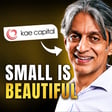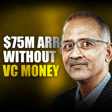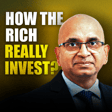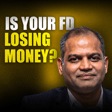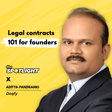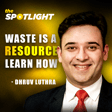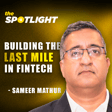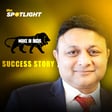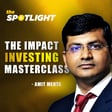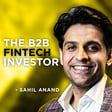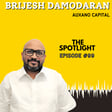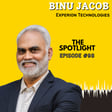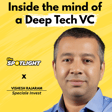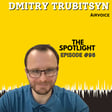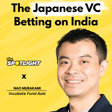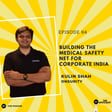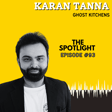Become a Creator today!Start creating today - Share your story with the world!
Start for free
00:00:00
00:00:01

Helping India travel sustainably | Sudip Ghose @ Uppercase
Sudip is a luggage industry veteran having working in leadership roles with luggage companies for more than a decade. In this candid conversation, he shares the journey of becoming an entrepreneur at such a late stage in life and how he is fundamentally changing the business model of the luggage industry by using smart technology.
For more such interesting founder journeys, subscribe to our newsletter www.founderthesis.com
Transcript
Introduction to Sudip Grosch and Uppercase
00:00:00
Speaker
Hi, this is Sudip Grosch, and I am the founder of Eastwood Accessories, owners of Uppercase brand.
What is revenge travel and its impact on travel brands?
00:00:20
Speaker
Have you heard of the phrase revenge travel? It was coined after the lockdowns lifted. And the implication was that people have not been able to travel for two years and will now make up for it by travelling like never before. And while this trend means costlier flights and crowded airports, it has also proven to be a major boost for uppercase.
00:00:40
Speaker
The D2C luggage brand launched by Sudip Ghosh, who is the former managing director of India's largest luggage company, VIP Industries.
Sudip's journey to disrupting the luggage industry
00:00:49
Speaker
Sudip is a luggage industry veteran, having worked in leadership roles with luggage companies for more than a decade. And in this candid conversation with Akshay Dutt, he shares this journey of becoming an entrepreneur at such a late stage in life and how he fundamentally changed the business model of the luggage industry by using smart technology.
00:01:08
Speaker
Stay tuned and subscribe to The Founder Thesis Podcast on any audio streaming platform to learn from India's finest founders.
Sudip's career before entrepreneurship
00:01:25
Speaker
Could you give an overview of your non-entrepreneurial part of your career before becoming an entrepreneur? I started as an even marketing guy. Actually, even marketing was not even in fashion. It used to be a small agency of organizers. Some time in 1996.
00:01:49
Speaker
And by working there, I understood that it's something which interests me, especially with lead to field. And I got an opportunity to work with Bosch and Long. I was there, what to add. Currently, it's called trade marketing at that time, which can be called themselves promotion. And I was given charge of South of India. And that's where I left my hometown Targeta for the first time at the age of
00:02:17
Speaker
24, I think, if I'm never right. Slowly I worked from marketing to sales, and then I changed organization to world pool, and there I joined again in the trademark finger, and then, and I moved to Proko marketing.
00:02:37
Speaker
when I launched the microwaves for Whirlpool at one point of time. One for Whirlpool, where I spent about four and a half years, I switched to Mark Electronics, a popular brand called Oneida. They are going to spend. So in Whirlpool, I did a lot of product marketing.
00:02:59
Speaker
I did a lot of communication, advertising, and media, and that actually made me a full-time marketing guy. I only had experience in my previous roles. That somewhere I kind of got into reliance. I was part of
00:03:20
Speaker
I worked there for about two years. And then I got an opportunity to get into luggage business, which initially was something that had declined. I actually had said no to the job.
00:03:38
Speaker
Somehow, I lost them, convinced me that it's a good opportunity because I quit Reliance and joined Samsonite. I spent about five years in Samsonite, where I had launched and ringed out some great brands. And then I was given an opportunity to work with VIP.
Transforming VIP into a billion-dollar company
00:03:57
Speaker
The competition, I took a six, eight months break and then I came and joined VIP.
00:04:03
Speaker
I went about my head of marketing and slowly worked myself up as to the relationship CEO and then eventually managing director. I ran that company for quite a bit and those were my best phases of careers of my professional career, not the independent career, I think.
00:04:23
Speaker
That is a new phase which has started for me. You had told me that at VIP you played a role of a turnaround expert. Just tell me about that. When I joined VIP as the marketing head, they were going through some difficult times. One of the things that I realized
00:04:43
Speaker
is they have too many brands and all of them look and did the same thing. So they were cannibalizing against each other. Also... What were those brands? So VIP has about five brands. It has VIP, it has five brands. It has Aristocrat, it had Alpha at that point of time. It had Caprici and it had Calder. So six at that point of time.
00:05:12
Speaker
And everybody was doing the same thing. And it was cannibalizing. So first and foremost thing I did was I cut down alpha. I said, we don't need that brand. And I realized that if I touch VIP brand, and if I go wrong, then the organization will collapse. So think of a building which is standing on a pillar. And if you want to be safe and make the building straight, what you do is you build different pillars to support.
00:05:41
Speaker
So, the first thing that I did was I changed the way Skype had looked, de-positioned the brand as the int brand and created a very strong pillar and certainly, Skype had become as big as VIP. Then I took aristocrat and then that also became a lower end brand.
00:06:00
Speaker
where we came to the second pillar. Then we created Carlton which also came into support. So we had a brand at the top of his Carlton with a huge brand which was Hypax. We had a lower brand which was a district brand. Once that was done, then we revamped VIP into a different style.
00:06:18
Speaker
And that is where the organization got one of the response from the consumer. Suddenly, instead of having one gun firing, we had five, six guns firing from all sides. And therefore, we started doing very well. We have a very realistic company. The share prices went down from about 60 rupees to about 637 rupees if I have to understand. Amazing. 10x growth. Okay. 10x
Factors driving luggage sales
00:06:46
Speaker
growth. The value got added.
00:06:48
Speaker
During that period, the organization touched a billion dollars. Building a billion dollars was not so easy to get the way it is these days. And I guess all of this put together had one feeling back in not only the market, but overall people who worked in the Christian region, very, very low.
00:07:13
Speaker
And I think that that has been a great learning and an opportunity for me to turn around a very traditional organization into a mammoth needle. In fact, I must say that globally, if you see, Sanskrit is always number one across all countries, except for India. In India, Sanskrit is number two.
00:07:38
Speaker
What is number one? V8 is about 60% market share. So that's the kind of dominance we had and we did not allow multinational to come and get the market.
00:07:57
Speaker
VIP is a manufacturer also. They make everything in-house. Yeah, everything is manufactured. VIP has factories in India and factories in Bangladesh. We also buy stuff from China. When I started to go to VIP, VIP only used to work 30% of what they sold. When I left, it was 70% of what they sold. So I guess it was a huge and therefore if you see on the gross margin,
00:08:23
Speaker
There was a bump because the manufacturing margin we started doing things on our own and the manufacturing margin also went into the bottom line. It changed from
00:08:35
Speaker
trading to a manufacturing organization when I was at that organization. Amazing. So what sells suitcases? You know, is it like distribution that if you are present everywhere, then your suitcase will sell? Or is it celebrity endorsement? Is there a seasonal effect? You know, help me understand this market a little better. Yeah, so I have this favourite line I say as people eat, sleep, drink, people travel.
00:09:06
Speaker
And when people travel, they need suitcases, they need luggage. The luggage demand is not throughout the year. But yes, there are spikes and the spikes in India happens primarily because of wedding and of hungry travel.
Entrepreneurial leap during COVID
00:09:23
Speaker
For backpacks, obviously, then there is school season, which is something that I introduced. Our industry never made backpacks. I first introduced backpacks in Samson, I didn't know I was going to be interested. Then when I shifted to VIP, we got Skybat.
00:09:41
Speaker
doing the same. We used to sell, you know, the last number I remember, we sold about 4 million bags in one season for Skybags, far more highest ever, now that we did 4.3 million units we sold. So yeah, there are spikes but people buy luggage because people travel and as long as people will travel people will buy luggage.
00:10:07
Speaker
But what drives sales for a company? Is it important to pricing, distribution, branding? Over the last one and a half or two decades, I've seen a huge transformation from luggage being a commodity buying when people never cared and I have seen people in business class wearing the best stock brands but carrying them.
00:10:27
Speaker
an unknown brand of luggage to today where luggage has become an accessory like your specs or the sunglasses or the watch that you wear. A lot of effort has gone in by various brands to create it and I think the consumer understanding and outlook towards the category has changed quite a bit in the last decade or so. So today luggage sells because
00:10:56
Speaker
of features because of its weight, because of its toughness, because of its design. Consumers become lucky for various reasons. The ones that I just said are the ones which are the top couple of reasons why they buy.
00:11:15
Speaker
As far as price is concerned, there are two segments. There is still a segment which is very conscious about price, but there is a segment where we buy a good luggage at a great price. So it's a mixed bag, but definitely design, performance and price are the three most important aspect of any luggage buy.
00:11:39
Speaker
You were running a billion-dollar business at VIP.
Uppercase's business model and profitability
00:11:43
Speaker
What made you want to quit and start something in that same industry? What prompted that journey into becoming an entrepreneur? That was COVID. I will be very upfront. Prior to COVID, I was running a great company.
00:12:01
Speaker
doing wonderfully well, red brands. Two things happened during Covid. Covid got the e-com sector going in a big way. We are primarily an e-com-driven company and e-com grew in six months what otherwise it would have grown in 10 years. So, that opened a huge opportunity.
00:12:24
Speaker
COVID also brought us that every business that we've been doing could be done in half the cost or maybe one third of the cost. Give me an example to help me understand this. COVID taught us that we don't need 29 offices. We don't need 20 course of travel. We don't need a thousand people.
00:12:49
Speaker
to have an organization, we need change the mindset of
00:12:54
Speaker
lot of people including me and I think I felt that there is an opportunity for somebody to do the same business in the same industry very differently than what it's been done by the rest of the guys. Because in VIP I couldn't have changed because there is only that much you can do for a mammoth ship which is already floating and doing very well.
00:13:23
Speaker
while you should go back and start creating your own ship, you can do things the way you want to do it. I did not need a job to survive. I had reached that position and I could take the risk that I took.
00:13:44
Speaker
Over the years, I have been able to financially secure me and my family to a large extent. So all of these factors put together and obviously the biggest thing is to create something for yourself and for the team that is working with you. It's a different household
Challenges of leaving corporate life for entrepreneurship
00:14:07
Speaker
together. When I quit, I was 48.
00:14:12
Speaker
It's time to get into it and see if, you know, somebody believes in us. Fortunately, a lot of people believed in us and our vision and start.
00:14:24
Speaker
So, okay, you said that you realized that there is a better way of building a luggage company. What is that better way? What are those things which you felt you needed to do differently? It's quite simple. Typically, a luggage company has a gross margin of about 55%. But if you say 50% there is, if you say we have it, it's about 30-40%.
00:14:52
Speaker
I want to create a company with a 50% rush margin and 30%. Keep the costs down. Operate with the very skill and trim organization and use as much technology as possible because to be technology, you can enable your entire supply chain, your entire sales team.
00:15:15
Speaker
We hardly travel built-in algorithms where we exactly know when to advertise, what to advertise. These help us to conserve cash to a very large extent. I am a firm believer that if you are into business, you need to make money and I don't understand
00:15:38
Speaker
making losses and getting valuations. I do firmly believe that even if I'm making 200 crores or selling 200 crores, I need to make a 60-70 crore of profit. If I don't, then I'm not a good businessman. So tell me the journey. So you quit VIP. You are now without a job. How do you start building up ACE4? So the journey started much before I quit VIP.
00:16:05
Speaker
The journey started the day I walked to my wife to say I'm going to quit. That is when the journey started. Initially it was a shock for her. A good job, especially a corner of his job, not only brings a big paycheck, but it also brings social recognition for both you and for the individual and the family.
00:16:29
Speaker
my kids came to our office we were building a very small office and they walked into the store there was a small kitchen which was used by the previous tenant and we turned that into my room and a very small very small room if you come to your office and my kids came and they said dad where is your office I said this is my office
00:16:52
Speaker
They looked at me and said, how come? Because our previous office was as big as the entire office that we have. I also realized that the world also starts seeing differently towards you.
00:17:04
Speaker
truly believe is jobs will give you great savings, a great job will give you a great saving, bigger job will give you a bigger saving. But if you're on to something, you can actually create wealth.
Fundraising and building a strong team
00:17:16
Speaker
To create wealth, you need to take that risk, let the safety net go and see where you fall. I have been dragging my family all over the country, so this was one more time, but I said no. The operator who bombed me, the first thing that we did after I got relieved from VIP is to take a holiday.
00:17:32
Speaker
I quit in Paris on 31st of January 2021. 5th of February is our anniversary. It was during COVID. So all four of us took a holiday and it was the best holiday that I had. I had no tension, nobody was calling me. No board meetings to be planned. And when it came back, then it kind of slowly started sinking in that you're on your own.
00:17:58
Speaker
It's scary. But yeah, then I kept meeting people. He made a first presentation. Meeting people for fundraise, like you wanted to. I was very fortunate to meet a gentleman called Mr. Arnaud Monbém, who later became my CFO and co-founder. I met him and together we created the people.
00:18:20
Speaker
The interesting part is I started going out looking for funds when the second wave of COVID was hit in India. I very clearly remember my first presentation to a merchant banker or a fund manager was 20th March 2021. It was very, very scary. The world was shutting down. And here I was trying to open a travel business.
00:18:47
Speaker
And I didn't expect that I would get the function fast. So I actually was lucky. What really played for me was the fact that I have
00:19:00
Speaker
been well recognized in the industry, which I was trying to get into. Only I was trying to do the business in a different way. And therefore, it was not very difficult for me, let me be truthful, to raise the, I was trying to raise up a million and a half to start with the seed money. I got a very, very good valuation at that point of time.
00:19:24
Speaker
and we raised it in the world to one's time, by June actually, when we had come into the banks and then things started rolling.
00:19:35
Speaker
So, yes. You must have had like a sequence that let's build first supply, then let's build the marketing engine and branding and all of that. Like, you don't tell me that like each of those. First thing that we did was to find a name for the brand and what would the brand stand for and what exactly would we like to do?
00:19:56
Speaker
The name was very interesting. We found the name. We found the name uppercase. And it's very nice if you see the brand, it's called uppercase written in lowercase. A lot of people are very smiling. You have the brand. Some people have said that they made a mistake.
00:20:12
Speaker
What is upper case in this? I said, good that you asked. That's the whole point of making it that way. For us, it would mean that we are upper in the case business while everybody else is lower. So that was the rationale behind it. So the name came first. There will be a financial model out of what we want to present and where do we want to reach in three years, five years time.
00:20:40
Speaker
what kind of products we wanted to do because our products are very very different from what so it was not available we had to kind of create some products and shown so that's how we went to the first fund and the first fund gave us which is our first fund was the fund called Volarado which is an offshoot of the Inan group so they were the first to kind of believe in us and
00:21:04
Speaker
putting a large sum of money and the advantage was the rest so they put in close to about a million and the half a million came in from all my ex-bosses. That's very interesting. All my ex-bosses put in money from my various organizations from Bossial Norm to
00:21:24
Speaker
my boss, who was at that point of time, who was my ex-boss in Ansonine. So all of the input in my analysis that also gave me a lot of satisfaction that, you know, people who have been my mentor have kind of come together and believed in me. I had some good angel investors and the way you choose an angel investor is not just for the money because also because these are the people with whom you can bounce off your ideas and then
00:21:53
Speaker
telling me great and good advice. And then the other thing that we did is bet very well on people right from day one. In fact, in my entire model, the only risk that I've taken is people. Our people cost is very, very high. But we have taken it so that these number of people initially will be high because obviously my turnovers are very low. But these are the people who tell you have far larger numbers once the business sets in.
00:22:22
Speaker
As in you hired like a head of technology and like a head of procurement. Exactly. So first thing that I did was I added a couple of co-founders because if you make it big, then they need to make big. And all of them quit some very, very good and serious portfolios that they were handling and came and started working with us. So they all hold a percentage of the company. Then we also took in some senior people in various functional head.
00:22:51
Speaker
We have head of procurement, we have head of sales and marketing, head of sales and marketing, the gentleman who created cards, women fashion and luggage business. He knows how good we come. We picked up the retail and gel trade shade of a very large shoe company who had worked with me earlier in VIP. We picked up a very good procurement. The first team that I actually employed was the design team.
00:23:20
Speaker
in the organization. So we got the design head, four design people came in.
Sales strategy and manufacturing in India
00:23:25
Speaker
And we started working on it because we wanted to show when we went for the pre-series A round, we had the products ready. Products in the sense, not going into production, but we had actual products from last and last. When we had gone, we had created visuals. This time it was actually products which were there.
00:23:46
Speaker
So now we are a team of about 28 people, currently. And we probably will be 39 now this year. And this 30 will tell you of that 100. How did you sell your first, like, say, first 1000 pieces of luggage? Like, what was the process of doing that? How did you source it? What channel of sale did you use? So we are primarily there, we call
00:24:15
Speaker
company. We are now getting into offline because my equity in offline is very high and I have been you know the dealers and the pursuitors of themselves approach and say I would like to sell your product. We're figuring out how to sell the same product online and offline. My first thousand pieces got sold in marketplace. So we don't sell to e-com, we sell on e-com. There's a difference between. Most of the companies go and sell to e-com which means they're selling to
00:24:46
Speaker
the Ecom platforms we sell on our own. Like the seller services like Prion or whatever it is. Yeah. And that helps us to control and manage the price. That's what we would like to do with forward also. We are operating on all. So when you sell to Ecom, in that case, you don't control the price and all. Like they will negotiate a price with you. You don't control the price.
00:25:11
Speaker
And after that, you go control this, the word price at this set. So that is very scary. So I believe that might be a very deep discount where in your brand and the other channels might get impacted. We are very clear from day one that we will sell on common option.
00:25:28
Speaker
Because they are taking the inventory risk there. Yes, yes. Here the inventory risk is totally us. We pay a charge to them, which we are very happy to pay. And that way we manage pricing across the board. The flip side of it is, I don't get large volumes immediately, but over the period I've built our technology and our backend to ensure that we do sales. And currently we are doing pretty well.
00:25:50
Speaker
Why don't you get large volumes immediately if you're selling through e-commerce rather than selling too? Yeah, so when you send it to somebody, you can stack up, right? Initially you can stack up. Okay, so they'll straight away buy like say 10,000 or 1,000 or something. Yeah, 10,000 or 20,000 pieces. I will take
00:26:11
Speaker
X number of days to sell that. But what happens is when you sell it to them and it doesn't sell out, then you get stuck. So you will have initial numbers, but going forward it will become very difficult. In our world, our initial numbers will be lower, but going forward it will be very, very small. So that's how that ends. Is there also like you were selling through e-commerce, like how did you build the supply for it?
00:26:39
Speaker
because obviously you would not be manufacturing at this stage. So now we have no contract manufacturing, exclusively manufacturing for us. We have got close to four or five trees now.
00:26:52
Speaker
churning out products that we want. We do the quality design, everything is ours. They provide manpower and the machines make the products that we want. That has been a very, very good model. I would like to continue with that for some time. And where are these factories? We have one in Uttarakhand, two in Gujarat and one in Maharashtra.
00:27:11
Speaker
All in India. Okay. Everything is India. Everything is India. Wouldn't China be cheaper? No. Two things. One, the entire sustainability, I would rather control here in India. Second, with China, the lead time becomes very high and I've operated China for almost all my luggage life. I exactly know how China operates. If you ask me, then
00:27:39
Speaker
Buying from China is easy, but then it comes to various other issues, which I feel is much more avoidable experience from India. Now in the last six months, we had major issues in terms of getting the right product from the right factory. But now I knew that after the initial pain, this will become a big advantage, very, very big advantage. And that's not exactly what we're doing.
00:28:09
Speaker
We are operating with very reliable sources which whom we have betted big and we want to deliver the best of products made in India.
00:28:24
Speaker
So you're saying that if you source from China, then it reduces your agility. Like if you want to change designs, then it will take a few months for the new set of designs. That is one. Second, the similar design to somebody else. Sometimes. OK, OK. You use your intellectual property. Yes. We are the business of selling luggage, not the business of getting to litigation. And these litigations let them know where. It's better that you have your control.
00:28:53
Speaker
And today, most COVID things are not very good there itself. And we have a lot of great things in India. Right, right, right. Plus, in India, the balance of power would be better. Like for China, you are one of many buyers. And for India, you are probably like a major buyer for that vendor. Exactly. For the vendor that we have, we buy everything in the main. We are the only buyer to them.
Advertising strategies and global expansion
00:29:20
Speaker
So I control everything there. It's almost like having your own factory.
00:29:23
Speaker
And how did you drive sales on Amazon? Was it like through marketing inside Amazon itself, or did you also do other stuff too? So there are two parts to it. There is a POCAL advertising, which is very important, which is advertising on Amazon. We also have created algorithms to know when to advertise, which day part to advertise, what series for backpacks and what size. And the very amazing data that we have.
00:29:51
Speaker
What is the way of thinking about it, like a little bit of maybe breadcrumbs you can share? It's purely by reading the data. We first and foremost put in a system which can read the data faster and the way the movement happens, the way the footfall happens. We read the data and then we test it with a small amount and once it starts working, we put in money behind it.
00:30:17
Speaker
For a startup, usually people say if the RO is return on advertising spend, this is about two, issue between 2 to 3 or 2 to 4, it is very good, the first two years. On the sixth month, we have hit a 3.8. So it's something that whoever is hearing, they are on this thing, how are you doing it? And I keep saying it's my secret sauce, I don't want to do that.
00:30:45
Speaker
So yes, it's a lot of... So this means that every one rupee you spend on advertising gives you 3.8 rupees of revenue. Yes, revenue. Yes, yes, yes. That's exactly what I mean. So that's my last month. This month, we intend to make the table better. My target is to make it 1.5. Oh, 15. Okay. In the first week. 1.5. I'd love to get it to 50, which will happen someday.
00:31:12
Speaker
But yeah, as of now, we're talking 50. And you're doing it on like the usual Google AdWords, Facebook, like these channels. All of that. All of that. Now we are getting into offline. We just had a huge media understanding between various companies to see how we would do a bit of offline advertising as well. Because now we are going offline in terms of trade. Institution is very big.
00:31:40
Speaker
Even today, the reach of television is very high. That's what the numbers are saying. You said institutional. What is the institutional like? What is that? It's a B2B sales, like, you know, you sell it not to the consumer to an institution, then they sell it to. And then they give it to their employees. Computer companies, for instance, you buy a laptop, you get a bag free, along with it. Why can't we have an upper case bag?
00:32:05
Speaker
And since we are sustainable, it's something that the team would also like because we are the only company who can.
00:32:12
Speaker
keep that proposition, which no other company in India can give. Overall brand awareness is key. Okay. So why don't you want to do Modern Trade? And just for our listeners to clarify, so general trade is like the shops, which you go in your local market. Modern trade is mom and pop stores, food, large chains, like shop and store. Reliance and, you know, Reliance and, you know, Cintrio and all the other stuff there. The cost of doing business in Modern Trade is very, very high.
00:32:42
Speaker
They operate on consignment. They want us to put up people. Margins, they want large margins. Those are killing, especially putting up your own people. So modern trade will give you large numbers, but at the cost of margin? Not exactly. It's not like they are running away with all the business.
00:33:09
Speaker
Even in VIP, the general trade is still much more bigger than the bottom trade. But yes, in a crux what you said is right, they will give you top line without the bottom line.
00:33:23
Speaker
Which all product categories have you launched? We have already launched the backpacks and soft luggage. We are further adding hard luggage. There are various types of backpacks. We only have college backpacks and we just are launching professional series which have office load bags.
00:33:39
Speaker
They also look very different. They are not the regular black and blue groups of the world. They are not the regular shapes actually. Silhouettes are very very different. We would be launching art luggage now. So our SQ count is going to be very very small. We are going to operate with a very very tight SQ cup. We will be launching another couple of art luggage and there are swoon bags, swoon bags sometime next year. So that's the plan that we have as well.
00:34:08
Speaker
So I was under the impression that hard luggage is probably what sells the most these days. So why did you start with soft luggage? Like why not do hard luggage, which is, I'm guessing that is like a bigger.
00:34:24
Speaker
Yes, yes, yes, absolutely. It's not that we did not try, we wanted to, but as I said, I was on our products that he sent me and for hard luggage to make us resetly hard luggage, it's difficult.
00:34:39
Speaker
try out various combinations and you know now finally we got the right combination which you know the luggage will also be sustainable yet it will withstand the large amount of force that will not crack. Now that itself took us at least seven to seven and a half months to figure that one out which we have now we were already given one for waiting for it.
00:35:04
Speaker
Therefore, we are now producing. Secondly, unlike in soft luggage, the investment to make a hard nugget plant is much higher. So, we also had to find somebody who could trust us and put up a factory which now we have.
00:35:20
Speaker
And hard luggage is made from recycled plastic bottles, like pet bottles. Part of it is recycling the plastic that you're already generating. When you're producing something, a lot of waste that you do, and you bring those waste back into the production of the new one. And you also need to add an X amount of virgin material. Otherwise, the strength of the luggage will not be there.
00:35:47
Speaker
So yeah, it's a mix of three different things. The pet bottle, the recycle plastic that you've already yourself generated plus a bit of virgin to it to make it strong and to, you know, the idea is to bring the virgin down as much as you can and keep increasing the recycle and the pet bottle paste to a large extent. That's what we are trying to do. But as I said, you know, you cannot
00:36:15
Speaker
It's like having a car and if it doesn't move, then no matter how electric car you have made, you cannot buy it. So if you're making a luggage, it has to be strong enough for the consumer to feel safe to put his products or her products in it. Does sustainability sell luggage? No, currently no. But tomorrow it will. Why do you feel that way? Because people, consumers are changing in a big way.
00:36:43
Speaker
And also, the way we see it is we have a huge amount of international assimilation. The way we see it is the next, once we stabilize island-day business, then they probably look to start looking at the market because their sustainable travel is a big thing. The same products can go with a little bit of tweaking.
Financial targets and future fundraising
00:37:03
Speaker
And in today's time there, it will be purely a digital prep. We don't want to put up offices, we don't want to put up
00:37:10
Speaker
But we just need a third party shipping partner. And we use all the technologies that we are using here to operate in those countries. So the model have changed. So it becomes easier for any company to become a global company now. If they think technology and if they think it's out of the box, then what the usual thinking about multinational brands are. But I feel they can't produce a multinational brand.
00:37:44
Speaker
The perceptive greatness of a brand is concerned. Cool. What is the turnover you do currently and what do you see yourself ending this year at like in terms of your monthly revenue? We started in the month of July, 15th on July. Then we are on the 15th of January. 22, 2022. Yeah. We are in 2022, we are in January 23, so July, August, September, September, January, it is six months old.
00:38:00
Speaker
both from quality and from
00:38:12
Speaker
We have already hit and man will run rid of property for us. The way we are saying it is, we would like to hit. Next year, do anything between.
00:38:24
Speaker
60 to 80 or 100 crores. Let's see how it goes. And do you need to raise more funds to hit that 80-100 crore? We might need to raise funds a bit, a bit in between because I'd like to do some advertising. We would only raise after we hit a certain round rate. I won't hit a year out of most of 70-80 crores before I actually go to the market.
00:38:47
Speaker
because I don't want to dilute my kambar company any further than it's already, it's the first two rounds helping, it is severe on us. It's not to, I don't even know, holding
00:39:03
Speaker
gives you control. I think competency gives you control. So I have no issues of letting go of the company as and when we need money. But yes, I would like to let go of as less as possible. And for that I want to prove certain numbers to the industry and to the funders. And that's what I would like to do before I go to a cheaper group of funds.
Advice for aspiring late-life entrepreneurs
00:39:29
Speaker
Cool. So you had like a 20 plus year corporate career before you became an entrepreneur. Any advice to people in like a similar state of life? You may be a swimmer, but you are a swimmer when you are swimming in a pool or a pond. Are you very similar river and ocean? Ask this question to yourself. It's a difficult ball game. Point one. The second question that you have to ask is if
00:39:57
Speaker
You fail, what is it that you are going to lose? That's the second question that you should ask yourself.
00:40:05
Speaker
Please, please, please ensure that you are financially quite secure for at least 24 months before you get into something because it's a very harsh world out there and not having a paycheck is key. I would say secure yourself for at least 36 months kind of a situation because you would need that much of firepower and the fourth and the most important thing is
00:40:32
Speaker
sit with the family, talk to them, be very blunt and be very truthful of what are the changes that is going to happen and not just pan and shiny but also socially as I said every job brings in a certain amount of social fabric so these are the things that we should do and then
00:40:53
Speaker
Believing yourself. I think it's a very cliche thing to say. But trust me, when time comes, sometimes you wonder. And that is the time when you really have to believe in yourself.
00:41:06
Speaker
The advantage of getting into an entrepreneurship at the latest stages, you would have made a lot of mistakes without learning from them and you would not make them when you were running your own ship. So that's a good thing and a very important thing because you have learned on the cost of somebody else and use that learning to progress further.
Podcast wrap-up and listener engagement
00:41:30
Speaker
So that's my advice and you should go forward.
00:41:34
Speaker
I think the advantages are tremendous. You know, a lot of your success, I would say, comes down to two things. One is your ability to judge, you know, that judgment skill which gets honed over the decades that you have spent.
00:41:51
Speaker
in terms of judging what product to start, how should it look like, what design, what channel to start with first. So that judgment has got development. Second is deal making. You have made these deals with these factories who are producing exclusively for you, which gives you a great advantage, which somebody who's a 20-something person starting off would not be able to do this kind of deal making, which you're able to do. Absolutely. Absolutely.
00:42:16
Speaker
You understand the consumer, you understand what sells. Yeah, and the risk is limited. But yeah, there is always a risk.
00:42:25
Speaker
And that brings us to the end of this conversation. I want to ask you for a favor now. Did you like listening to the show? I'd love to hear your feedback about it. Do you have your own startup ideas? I'd love to hear them. Do you have questions for any of the guests that you heard about in the show? I'd love to get your questions and pass them on to the guests. Write to me at adatthepodium.in. That's adatthepodium.in.
